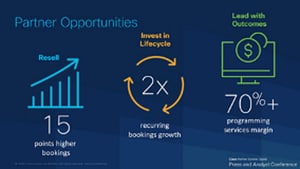Plus, a look at their new partner program
With all the uncertainty in my country and the world right now, it was comforting to have a consistent message from Cisco during their recent partner summit. Cisco CEO Chuck Robbins opened the event with a hopeful message of agility and resilience – skills that have been tested in my household these last eight months. My husband is a commercial airline pilot and for an industry not known for their agility, they’ve moved quickly in altering routes and schedules. Needless to say, our household has tried to embrace both agility and resilience amidst the uncertainty, to varying degrees of success. I’m sure many of you have your own stories of needing to adapt quickly to job, family and life changes.
Although no one pretends we are back to ‘business as usual,’ Cisco did not dwell on the lasting impact of our recent struggles around a global pandemic, contentious election and civil unrest (not to mention fires, floods and hurricanes). Instead, Cisco executives re-affirmed three priorities for the partner community we’ve heard in previous events. In a time when agility and resilience are increasingly needed to cope – their consistency is greatly appreciated.
Priority 1 – Customer Success
The refrain is similar for every vendor moving to a subscription or consumption model – in addition to landing the customer, we need to focus on adoption, expansion and renewal. Cisco provided an update to their customer experience lifecycle initiative, their framework for moving a customer from evaluating to choosing to loving (or advocating for) Cisco.
Like many others to produce outcomes to a customer’s business opportunities, Cisco needs partners to drive customer adoption and provide value throughout the lifecycle. Over 200 partners have attained the Cisco Customer Experience specialization. This measures partners on their investment in the people, processes and tools to support a customer throughout the lifecycle and to drive successful outcomes. Next year, this business-level specialization will be a requirement for partners to reach gold status.
 But the benefits of engaging in the customer lifecycle go beyond a checkbox to attain gold level. Cisco reported that partners who resell business-critical services within the customer experience offer, which are advisory services based on insights and analytics to help customers realize their business outcomes, see an average of 15 points higher bookings. Cisco also claimed that partners who invest in customer lifecycle services double their recurring bookings growth. And partners that create their own Intellectual Property (IP) on top of the customer experience offerings realize more than 70% programming services margin.
But the benefits of engaging in the customer lifecycle go beyond a checkbox to attain gold level. Cisco reported that partners who resell business-critical services within the customer experience offer, which are advisory services based on insights and analytics to help customers realize their business outcomes, see an average of 15 points higher bookings. Cisco also claimed that partners who invest in customer lifecycle services double their recurring bookings growth. And partners that create their own Intellectual Property (IP) on top of the customer experience offerings realize more than 70% programming services margin.
Priority 2 – IP Development
This services-margin growth is one reason Cisco continues to push for partners to add their own IP onto the Cisco offering. IP development increases partner differentiation which leads to increased service opportunities and profitability. Partner IP also makes the Cisco solution stickier or ingrained with the customer. DevNet, launched 3 years ago, is the developer program that allows customers and partners to use Cisco APIs and SDKs to extend their Cisco solutions. To reiterate the emphasis on customer success, Cisco brought DevNet into the Customer Experience team about a year ago to help customers adopt and be successful with the technology and accelerate their time to value.
Partner IP development is so important, there are three levels of engagement options.
- DevNet certifications help partners train their teams to develop on the Cisco solution. There are over 1,000 DevNet certifications earned by individuals in nearly 400 partners.
- Partners can become DevNet-Specialized with validation of their technical skills, development practice, and past customer engagements, ensuring they are true authorities in programmability with Cisco solutions.
- A solution portal, DevNet marketplace, features third party applications and services.
Priority 3 – Managed Services
In the yearly PartnerPath State of Partnering studies, partners indicate managed services are their most profitable engagement method (above pre- and post-sales services and well above hardware or software reselling). Cisco leadership was clear during the digital summit that partners need to embrace as-a-service models and ramp up their capabilities of offering these solutions as a managed service. This is a new business model for most Cisco partners – taking hardware, software and services together as a solution and delivering that solution as a service to customers, typically as a monthly subscription.
Cisco also offers its technology as a managed service and expects partners to implement these solutions, even though Cisco manages the service. (Confused yet?) To help clarify the role of partners in the Cisco managed services offering, Cisco is retiring the standalone Cisco Managed Service Provider program in favor of the new unified program described below.
A New Cisco Partner Program
These three priorities are demonstrated in a newly announced unified partner program framework. The program is still being designed, so we only have the broad strokes. The new program overhauls the twelve unique programs that have popped up over the last decade as Cisco’s business and the channel have morphed. It takes the Cisco Managed Services Provider Program, the Consultant Program, Integrator Program, Solution Technology Integrator Program, Solution Partner Program and a myriad of certification, authorization and specialization requirements and smooshes them into one unified program. The new program is based on four roles partners play with customers: Integrator, Provider, Developer and Advisor across three levels: Select, Premier and Gold.
- Integrators are the legacy Cisco partners who engage primarily in a resale motion and bring expertise and services to solve customer business problems. Cisco removed some of the requirements which didn’t provide any differentiation between partners and the current Business Specializations are becoming optional but will continue to count toward progress up the levels.
- Providers are experts at delivering on customer outcomes via managed services and SaaS solutions. Subscription-based models are a hot industry topic and engaging, empowering and managing partners to be successful with these models are on every vendor’s priority list. We believe partners will transition from solely the Integrator role to also offering managed services as a Provider. This role is an evolution of the Cloud and Managed Services programs and will have a Gold level soon.
- Developers deliver complementary products, software and services that drive customer-specific outcomes. As discussed above, DevNet will be the way Cisco engages developers with APIs, SDKs and Sandboxes to build custom applications that work on Cisco platforms. With the new unified program, there is increased support for developers and new incentives including co-marketing and co-selling opportunities.
- Advisor is a new role where Cisco will formally recognize partners for the influencer and advisor impact on the customer lifecycle. Typically involved during a pre-sales conversation, this role often kickstarts the customer lifecycle engagement with discovering a customer’s desired outcomes. In this program track, partners may receive referral fees (for those that can accept them) and early access to technology roadmaps
Partners can participate in several tracks at different levels. They can be an Integrator at the Gold level and a Provider at the Select level. Competencies will still be an important way for partners to progress up the levels and access incentives. The new program incentives will be more value-based (Cisco is well known for its Volume Incentive Program, VIP), shifting from rewarding partners for landing the new business to recognizing partners’ value across the customer success lifecycle – more incentive on driving adoption, expansion and renewals.
Even though Cisco chose not to leverage the Sell, Service, Build, and Manage labels which are becoming so popular in next-generation partner programs for high tech companies, this new program allows for flexibility in engaging partners with unique business models. For example, an advisor who has no interest in reselling should be getting a referral fee (or other incentives) instead of having to become a zero resell, reseller in the old Cisco program.

I’m looking forward to more details on the refreshed competency programs, merged specializations and authorizations and launch of the advisory roles as the program rolls out in the next 6 to 12 months. I’m also looking forward to more stability in politics, weather and global well-being, but I’ll settle for some good data on the state of the channel.
Diane Krakora is CEO of PartnerPath with two decades of experience defining the best practices and frameworks around how to develop and manage partnerships.



